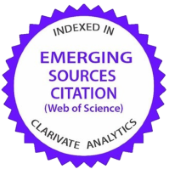Cointegration between Economic, Ecological and Tourism Development
DOI:
https://doi.org/10.29036/jots.v12i23.293Abstract
The well-developed countries have more options to attract tourists and generate profit from the tourism development. At the same time, the high volume of CO2 emissions, ecological risks, polluted nature restrict the tourism development in the country. The reorientation of global development to green growth provokes transformations in all policies of the country’s development. It allows green countries to attract more tourists. In this case, the paper aims to analyze the relationships between economic growth, ecological indicators, and tourism development. Ukraine has chosen the EU vector of development. In this case, it is necessary to identify the targets for synchronizing the Ukrainian policies (economic, ecological, social, tourism, etc.) with the EU. The objects of the investigation were Ukraine and Visegrad countries for 2000-2020 years. The panel data was generated from World Data Bank, Eurostat, European Environmental Agency, and Ukrstat. The dependent variable – GDP (as an indicator of economic growth), independent – greenhouse gas emissions and share of renewable energy in the total energy consumption (ecological indicators), the volume of tourists (indicators of tourism development). At the first stage, the study used bibliometric analysis to identify publication activities’ general tendency on the analyzed issues. The following methods were applied to check the hypothesis on cointegration between variables: panel unit root test, Pedroni panel cointegration tests, and the fully modified ordinary least squares and dynamic ordinary least squares panel cointegration techniques. The findings confirmed the relationships between economic, ecological, and tourism development. Thus, the decline of greenhouse gas emissions leads to increasing tourists, and as a consequence, it provokes GDP growth.
Downloads
Downloads
Published
Issue
Section
License
Copyright (c) 2021 Journal of Tourism and Services

This work is licensed under a Creative Commons Attribution-NonCommercial-NoDerivatives 4.0 International License.
Journal of Tourism and Services (ISSN 1804-5650) is published by the Center for International Scientific Research of VŠO and VŠPP in cooperation with the following partners:
- Juraj Dobrila University of Pula, Faculty of Economics and Tourism, Croatia
- School of Business and Administration of the Polytechnic Institute of Setúbal, Portugal
- Szent István University, Faculty of Economics and Social Sciences, Hungary
- Pan-European University, Faculty of Business, Prague, Czech Republic
- Pan-European University, Faculty of Entrepreneurship and Law, Prague, Czech Republic
- University of Debrecen Faculty of Economics and Business, Hungary
- University of Zilina, Faculty of Operation and Economics of Transport and Communications, Slovakia
The publisher provides a free access policy to the Journal of Tourism and Services.





